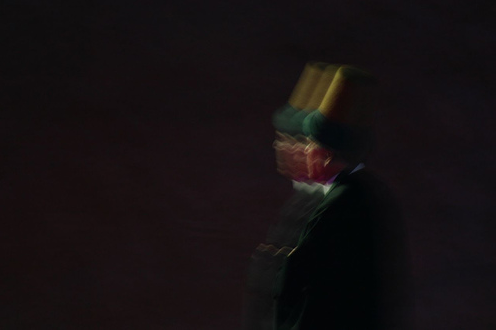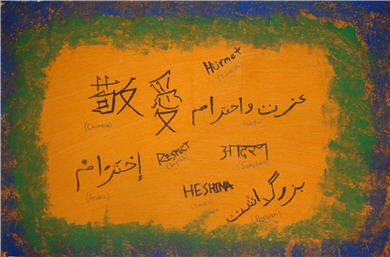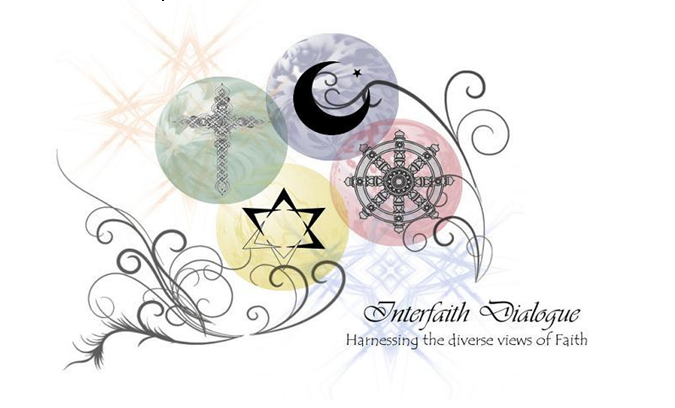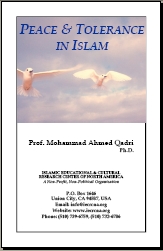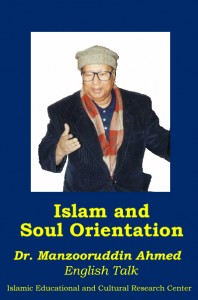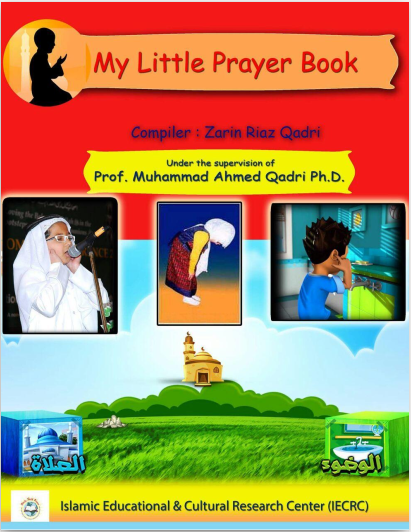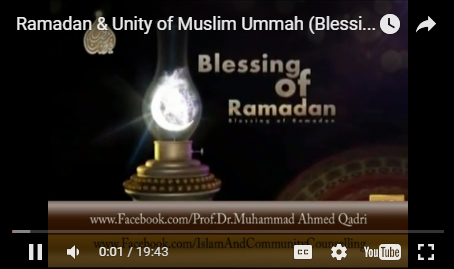New Book: Western Perceptions of Islam and Global Terrorism
Western perceptions of Islam and global terrorism is an analysis of the pathology of extremist behavior that has taken the modern world awry. Although, the word “terrorism” dates back to a couple of centuries, its modern manifestations are most disturbing in that it is paradoxically associated with the pristine tradition of Islam whose etymology as well as goal is none other than the establishment of comprehensive peace – with oneself, with one’s Creator, and with the rest of His creation. Islam, the book argues, is the solution to extremism, not the cause of it.
A Path Towards Harmony
February 1, 2004 / Dhul Hijjah 1424
Volume 1, Issue 4
The basic concept of mysticism in Islam is to know oneself and to know one’s Creator as the Hadith says:
“Whoever knows himself,
knows his Lord.â€
It is through this process that one discovers the unity in man. Selflessness is the substance of Tasawwuf (Sufism or Islamic Mysticism). Self-discipline is used to raise oneself above the self and identify oneself with the Divine Self. Man has to establish a harmony between his body and soul to reach the Divine Light that Allah Almighty has placed in him. The proper method to reach the Divine is to go through the following stages: Shari’ah (Islamic Outer Law), Tariqah (Islamic Inner Path), and Haqiqah (Ultimate Reality). There is no dichotomy between Tariqah and Shari’ah. Shari’ah refers to the laws that govern man and society.
Tasawwuf can be translated in English as metaphysics. However metaphysics may not explain the full meaning of Tasawwuf. Nevertheless, this is how it is typically translated. People of Tasawwuf are called Sufi (one of the meanings of which reflects the simple, woolen garments worn by the earliest Sufis). In Tasawwuf the first stage is to follow the path led by a Shaykh or Murshid (spiritual guide) on the journey to the soul. This is done through Bai’ah, or spiritual contract where the seeker promises for the sake of Allah and His Messenger (Peace Be Upon Him), giving his word that he or she will try to never commit a sin or do anything against the Shari’ah. In Tasawwuf, taking Bai’ah or giving one’s hand in the hands of one’s Murshid is in reality giving one’s hand in the Hand of Allah Almighty through one’s Murshid who is connected eventually to the Holy Prophet (Peace Be Upon Him) through his spiritual guides in a chain of transmission that connects heart to heart. In Tasawwuf the orders and commands of the spiritual guide must be followed. It is imperative to submit oneself to the Shaykh without any doubts because he is the Ameer (leader). Regarding this, Hazrat Shaykh Ali Hajweri (may Allah Almighty have mercy on him) refers the Quranic ayah:
“O People who believe! Obey Allah and obey the Noble Messenger, and those amongst you who are in authority.â€
[Al-Qur’an 4:59].
Follow Allah Almighty’s orders, and the Noble Prophet’s (Peace Be Upon Him) orders and “ulil amr†means spiritual guides.
A Sufi who chooses the path of Tasawuuf may finally reach the level of a Wali, i.e. a Friend of Allah. The Awliya Kiram (Noble Friends of Allah) and the Ulema Kiram (Noble Scholars of Islam) should not traverse different paths in different directions, but they should meet on the straight path, i.e. the Sirat-ul-Mustaqeem and hand in hand create in the human being the consciousness of the soul and the body. Hazrat Shaykh Ali Hajweri (may Allah Almighty have mercy on him) clearly defines in his book about the importance of the Shar’iah and that the people of Shar’iah could be excellent preachers of Islam through Tasuwwuf. Allah Almighty has said:
“There are servants of God who
walk humbly on earth and when
an ignorant one converses them,
they pray for his welfare.â€
[Al-Quran]
As the Holy Prophet Muhammad (Peace Be Upon Him) said:
“Those who hear the prayers of a Sufi and do not say Ameen, come in the list of the negligent, in the eyes of Allah Almighty.â€
The stated Hadeeth (saying of the Holy Prophet (Peace Be Upon Him)) clearly refers to Sufism and presents a comprehensive knowledge about acceptance in the eyes of Allah Almighty. The Hadeeth proves that Sufism was practiced in the blessed time of our Holy Prophet Muhammad (Peace Be Upon Him).
The people striving to attain and reach the Divine Light are those who curb their worldly requirements and selfishness and submit oneself to the willingness of Allah Almighty and His Beloved Messenger (Peace Be Upon Him). In a Hadeeth, the Holy Prophet (Peace Be Upon Him) said:
“Die before your death.“
When a Sufi attains to Allah Almighty, he never loses Him, and when he loses himself i.e. through the negation of his ego and super ego, he never regains it. This means that when he involves himself in the Dhikr i.e., remembrance of Allah Almighty, he never regains his own personality. According to Hazrat Abul Hasan Husri (may Allah have mercy on him): â€a Sufi is he whose existence has no nonexistence and whose nonexistence has no existence.†Meaning that whatever he attains, he never loses and whatever he loses he never regains.
In short, it can be said that Sufism is a comprehensive applied syllabus of cosmic law (Shari’ah). Mostly, people are confused with their social, political, economical and ethical viewpoints due to lack of knowledge of the Shari’ah which emphasizes human relations, forgiveness, and the most important aspect of society, i.e. tolerance. Tasawwuf is a knowledge of peace and justice, harmony among different cultural groups and supremacy of humanity. Contemporary social order requires comprehensive principles of Tasawwuf to be applied in the different societal institutions for the betterment of state, politics, public administration, international relations with reference to peace and justice in the world.
References: Taken from articles and speeches of Prof. Dr. Manzoor-ud-Din Ahmed, a distinguished professor of Columbia University, USA and Prof. Dr. Mohammed Ahmed Qadri, Founding Director of IECRC in CA, USA.
Sohail Rana Qadri & Aniqa Rana Qadri
Mr. & Mrs. Rana Qadri are active members of IECRC Canada and contributors to the IECRC Newsletter.
Respecting Cultural Values – A Criterion for World Peace
Issue # 13
May 25, 2008 / Jamadul Awwal 1429
Culture is the identity of every nation. It is the sum total of the shared values, emotions, and expressions of a people. Our global world today is a rich collection of ancient and modern cultures.
According to the Islamic tradition, the cultural diversity that comprises the world today is a blessing and by Divine Design. Its purpose is to interact and acquaint ourselves with one another. This interaction allows for increased understanding and subsequent enrichment which in turn contributes towards the promotion of peaceful relations between various communities.
It is the mandate of every religion to protect culture and promote cultural norms. Islam stresses co-existence. The Holy Quran clearly exhorts Muslims to protect the Christian church, the Jewish synagogue, and places of worship of all other peoples as much as they defend their own mosques. This is clear evidence of the emphasis that Islam has laid on tolerance and co-existence with other religions and civilizations. Islam also commands its followers to ensure the protection of all educational, charitable and cultural centers of other civilizations. It may be deduced that the non-profit organizations working in the field of education, health and social welfare all fall into this category. One can also refer to the word Sawamiah used in verse 40 of Chapter Al-Hajj of the Holy Quran, which stipulates that all establishments of other civilizations must be protected.
Whenever Christian scholars came to visit with the Holy Prophet Muhammad (Peace Be Upon Him) for a dialog, he (peace be upon him) arranged their stay in Masjid-e-Nabawi (the blessed mosque of the Holy Prophet, peace be upon him, in the holy city of Medina). On such occasions, the Holy Prophet (Peace Be Upon Him) not only held talks there, but also allowed the Christians to perform their religious rituals within the mosque.
However, one of the greatest problems in the world today is that we have stopped respecting cultures. We have adopted an “us versus them†approach. The modern world is facing serious challenges due to this single reason leading to class wars and unrest in the world.
The Holy Prophet Muhammad (Peace Be Upon Him) respected every culture. While he established an Islamic state in the Holy city of Madinah, he (peace be upon him) did not denigrate the cultural identities of any religion. On the contrary, he promoted the various Arab tribes. He protected synagogues and churches and directed his followers to pay respect to them. Whenever the Holy Prophet (Peace Be Upon Him) went out of the Holy City of Madinah with his noble companions (may Allah be pleased with them all), he did not trespass on the lands that belonged to the Jews and Christians. He (peace be upon him) did not allow the horses to even step foot on those lands that had agricultural crops on them. But he (peace be upon him) commanded his noble companions to protect these lands. In this way he laid the foundations for international law and peace. It is chilling to see that behaviors today are so antithetical to the teachings of this great final Prophet of God who is a Prophet for all of humanity. Peace Be Upon Him.
The Holy Prophet Muhammad (Peace Be Upon Him) practically proved the motto of the Peace Culture which is to “Live and let others live.â€Â “Peace for all†was not just a slogan but he proved it with his pristine teachings, stellar example and kind and forgiving nature that made everyone around him fall in love with his personality, and even his enemies were in awe of him (peace be upon him).
In the society that he created he adopted many techniques to transfer his knowledge to the people. He sent out delegations of His Companions who reflected the culture of peace and respect they had learnt from him. When the Holy Prophet (Peace Be Upon Him) met people, he would stand up out of respect for them.
He created an Administration Culture which centered on truth and honesty. Honesty is the best policy for the government, the legislature, and judiciary. The culture of Islam is that of balance of power and it negates any authoritarian school of thought and promotes a culture of tolerance and peace. In this culture, contrary to popular belief, Allah Almighty and the Holy Prophet (Peace Be Upon Him) have given tremendous amount of respect to women and children in the context of human rights. In this culture the use of force is prohibited. “Might is right†is not a component. The teaching of Islam is that everyone is equal. Modern culture includes language, ideas, beliefs, norms, codes, institutions, tools, techniques, works of art, rituals, ceremonies and symbols. Islam has incorporated these into its fold. Islamic principles teach to take what is good and leave out that which is not good. It is a dynamic body with its foundation anchored on a core firm set of values—the crucial recipe for any religion, culture, institution or individual to survive— the ability to adapt and include.
Today’s IECRC Conference is a bridge between the West and the East, a bridge among nations. The valuable research articles and presentations being made here will be a source of learning and eliminating many stereotypes. Conferences such as this are instrumental in the transformation of international cultural norms.
It is time we let go of the wars of the battlefield and psycho warfare and make working for humanity the aim of our lives. For social and world change it is imperative that the differences between the major world cultures and religions are put on the backburner and the similarities are highlighted. The world is our home and we are all brothers and sisters. All Prophets of God (peace be upon them all) have brought the same message of forgiveness, purification, tolerance, peace, and love. It behooves us to increase our intercultural communication and understanding so that we can make the world a better place for our children.
Prof. Dr. Mohammad Ahmed Qadri
Dr. Qadri is the Founding Director of the IECRC. He is the recipient of many international awards such as the prestigious “Ambassador for Peace†Award presented by the Universal Peace Foundation and Interreligious and International Federation for World Peace in Canada. Please see the section on Speaker Biographies for more details. He can be reached at ahmedq19@yahoo.com.
PRESS REPORT – Interfaith Communication: A Bridge Among Nations
The Islamic Educational and Cultural Research Center (IECRC) and the Canadian Women Counseling Center (CWCC) jointly organized a grand gathering of an Interfaith Celebration of the Birth of the Prophet Muhammad (peace be upon him) titled “Interfaith Communication: A Bridge Among Nations†on Saturday, March 6, 2010 at York Conference Center in Surrey, British Columbia. The beautiful gathering was attended by over 450 men, women, and children of many diverse organizations, groups, faiths, and cultures from all walks of life.
Group Conference Speakers and Organizers
This was the 5th year in a row that the CWCC and IECRC have conducted this annual spiritual gathering commemorating the life and birth of the Holy Prophet Muhammad (peace be upon him), the final Prophet to humanity according to the Islamic tradition. The conference was attended by interfaith representatives from several different religious groups including Pandit Acharya, Dr. Raminder Pal Singh, Mr. Allen Welding, along with representatives from the B.C. legislative assembly and the World Peace Federation, and heads of various social and political organizations. The speeches delivered represented a wide variety of backgrounds and topics.
Audience
Mr. Allen Welding, President of the World Peace Federation and Christian Leader said that our heart is not bound by geography, and that “We are one family under God.†He added, “Cooperation is a way towards peace, and humanity is one body. Humanity is not connected to God hence we harm one another. â€
Dr. Allen Welding
Dr. Raminder Pal Singh Kang, the well-known radio host of Sher-e-Punjab gave a direct message to the audience in which he mentioned the relationships between Muslims and Sikhs in history. Dr. Kang mentioned that the Golden Temple in Amritsar, the holiest place in Sikhism, had its first stone layed by a Muslim, and that Hazrat Baba Farid’s (may God have mercy on him) writings are a part of the Guru Granth Sahib. Dr. Kang reminded the audience that people have less time to read and study, and thus misinformation is spreading. He shared his experience describing how he had became a student of Islamic Philosophy after he had hosted several shows with Dr. Qadri about Islam on Sher-e-Punjab where “you can always talk about other mazhabs (faiths). ”
Dr. Raminder Pal Singh
Pandit Acharya Shrinath Prasad Dwivedi, a Hindu scholar, said that peace on Earth starts with the individual, not with an organization. With the modern world, distances are reduced, but barriers within the heart need to be broken. Pandit Acharya recited a self-composed piece of poetry in praise of the Holy Prophet (peace be upon him) that delighted the audience.
Pandit Acharya Shrinath Prasad Dwivedi
Senior government representatives were also present during the occasion. Bruce Ralston, Member of the Legislative Assembly, Surrey-Whalley, briefly wished all conference attendees well and congratulated the organizers on the conference. He also mentioned that what impressed most about Islam was its prohibition of Usury and the establishment of Zakat (the poor due).
Sukh Dhaliwal, MP of Surrey, mentioned that all religions emphasize social justice, that the teachings of the Prophet Muhammad (peace be upon him) was about social justice, human rights, and equality, and similarly that of Guru Nanak. Mr. Dhaliwal said that we can believe in different values, come from different cultures, and be different, yet at the same time love each other, respect each other, and thus “we have taken ourselves beyond tolerance, we have accepted each other.” He said that religious organizations are instrumental in providing social services, and congratulated Dr. Qadri and the attendees for promoting justice, accepting all communities, and conveyed greetings on behalf of the assembly.
Vice Consul General Tipu Usman of the Pakistan Consulate in Vancouver emphasized the need for dialogue as a way and basis to promote trust, and not as a platform for argumentation.
MLA Bruce Ralston
MP Sukh Dhaliwal
Vice Consul General Tipu Usman
Shakyh Ismael Khaleeq, Imam of the Kautharriyah Hussayniyyah Islamic Center, said that different cultures are like different colors in a garden; a garden is more beautiful with a variety of colors. He exhorted the audience to understand that ends do not justify the means, and to live a compassionate and loving life with each other.
Sheikh Ismael Khaleeq
Maulana Tayyib Qasmi, Principal of the Chilliwack Islamic College gave a brief but effective speech on the importance of remembering and honoring the Prophet Muhammad (peace be upon him), especially in the spirit of coming together as one community. He humbly prayed that his presence in this blessed gathering would become a means for his forgiveness on t he Day of Judgment.
Maulana Tayyib Qasmi
Mr. Tanveer Choudhary of the Pakistani Cultural Association spoke about the impact Allamah Iqbal, Pakistan’s famous national poet also known as the Poet of the East, had in a unified view of man and his place in the world. Maulana Abdul Lateef Nomani, Imam of the Fiji Islamic Center, highlighted the compassionate and self-sacrificing nature of the Prophet (peace be upon him).
Syeda Zille Humma and Fatima Sharaaz, both IECRC representatives from the United States, spoke about the meaning of love for the Prophet Muhammad (peace be upon him), and how the Prophet (peace be upon him) elevated the status and esteem of women by introducing essential women’s rights that have now been taken for granted, respectively. Dr. Syeda Saiqa Zubeda, Founding Director of the CWCC, spoke about the importance of love in Islam, saying that Sufism, the spiritual dimension of Islam, was Islam with love, and the real representation of Islam.
Youth from both the surrounding Surrey area, as well as those who had traveled from the USA to attend this event waved flags and recited the Naat poetry that describes the attributes of the Prophet Muhammad (peace be upon him). Among the youth and children were Abdullah Ayyaz Qadri, Abdurrahman Ayyaz Qadri (both studying to commit the entire Holy Quran to memory), Zaynab Ayyaz Qadri, Roha Imran, and Khizr Abbasi.
Both adult and youth groups from Surrey and the United States recited beautiful and heartfelt poems honoring the Holy Prophet Muhammad (peace be upon him) on this sublime occasion including Adeeba Iqbal, Amber Imran, Sohail Rana Qadri, Imran Qadri, Shaanawaz Khan Qadri, and Ismael Rajput.
Zaynab Ayyaz Qadri
Roha Imran
Khizr Abbasi
Amber Imran
IECRC Naat Group from Surrey
Recitation of Burdah Shareef
Ismael Rajput
Mr. Charan Gill, Executive Directory of PICs, a progressive social welfare organization in Surrey, presented IECRC with an award for outstanding community service. Various other awards were rewarded to groups and individuals working to promote peace and social justice.
Mr. Charan Gill
To conclude the conference, Prof. Dr. Mohammad Qadri, a world renowned scholar from the family of the Bani Hashim (the family of the Prophet Muhammad – peace be upon him), and Founding Director of the Islamic Educational and Cultural Center delivered the concluding remarks about the universal message of brotherhood that Islam conveys with references from the Holy Quran and the Life of the Prophet (peace be upon him). Dr. Qadri said that the Prophet (peace be upon him) conveyed the message of Islam to make our ethics the ethics of God. He said that if we pay respect to others, we and our community will be respected by others. Dr. Qadri stated, if you love humanity, God will love you. He reminded the audience to follow the Prophetic example and to be forgiving and merciful.
Dr. Qadri reminded the audience of a very important communal requirement that is aimed at supporting those in need under the most trying circumstances. He called to pass a resolution in favor of an endowment fund for funeral costs, which was passed by the community with no opposition.
Prof. Dr. Mohammad Ahmed Qadri
Sharaaz Qadri, Director of IECRC in the USA, was emcee for the evening. Throughout the evening, Mr. Sharaaz Qadri gave references from the life of the Holy Prophet (peace be upon him) that reminded the audience of the tradition of compassion, mercy, respect, tolerance, in Islam. As is tradition in Milad Shareef gatherings, the program began with a recitation from the Holy Quran, the Muslim holy book, and poetry in Praise of the Prophet (peace be upon him).
Sharaaz Khan Qadri
The vote of thanks was given by Mr. Ayyaz Yousaf Qadri, Managing Director of IECRC-USA. He thanked all the guests for their participation, and thanked all the volunteers of IECRC and CWCC for their immense dedication and hard work for making this spiritual, educational, cultural, and social event a great success.
Dr. Mohammad Ahmed Qadri finally led everyone in a standing salutation (Salam) to send greetings and blessings to the Prophet (peace be upon him).
Salaam and Dua
Salaam and Dua
For feedback on this conference you may write to info@iecrcna.org or cwcc04@yahoo.ca.
5th Annual Conference – Interfaith Communication: A Bridge among Nations – 6th March 2010
The Islamic Educational & Cultural Research Center (IECRC) and The Canadian Women Center cordially invite you to celebrate the birth & life of the Prophet Muhammad (peace & blessings upon him & his family) at the
5th Annual Conference – Interfaith Communication:A Bridge among Nations
A family event on 6th March 2010, at 2:00 pm
For further information please contact:
Prof. Dr. M. Ahmed Qadri: 778-241-2371
Muhammad Iqbal: 604-505-5700 / Asif Bajwa: 604-507-1815
Sohail Rana: 604-787-3122 / Nasar Khan: 604-551-5426
Venue:
Unit # 202, 12888 80 Avenue, York Conference Center, Surrey, BC
Entrance is free and dinner will be served!!!
What is Tasawwuf? An Answer by Hadrat Ali bin Uthman al-Hajweri
What is Tasawwuf? An Answer by Hadrat Ali bin Uthman al-Hajweri
[gplayer href=”https://www.iecrcna.org/publications/audio/english_speeches/what.is.tasawwuf.data.ganj.buksh.mp3″][/gplayer];
Islam and Soul Orientation
[gplayer href=”https://www.iecrcna.org/publications/audio/english_speeches/IslamAndSoulOrientation.mp3″][/gplayer];
2nd Annual Women’s Naat Shareef Mehfil – Sacramento, CA – June 21, 2008
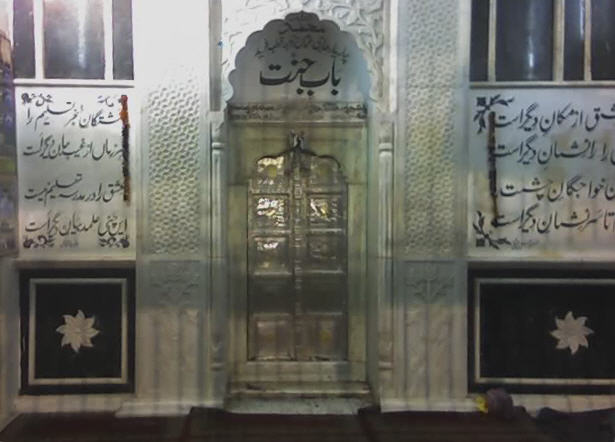
The 2nd Women’s Naat Shareef Mehfil in Sacramento dedicated to the Great Wali of Allah (Jalla Jalalahu) Hazrat Baba Farid Ganj Shakr (may Allah have mercy on him).
The IECRC is a six year old non-profit, non-political, 501(c)(3), grassroots, community service organization, based in Northern California, created in the wake of the September 11th tragedy with the mission to promote spirituality through education, research, and counseling, based on the centuries old Islamic traditional values of the Awliyah (the Saints of the Islamic Tradition) — love, tolerance, peace and harmony.
The Islamic Educational & Cultural Research Center invites you to its 2nd Women’s Naat Shareef Mehfil
Saturday, June 21 , 2008
2:00 PM – 6:00 PM
Smedberg Jr High School
8239 Kingsbridge Drive, Sacramento, CA 95829
Please arrive on time for timely completion.
Refreshments served throughout.
For information, call :
Sacramento: Fatima Sharaaz Qadri – 916-687-7547, Bushra. S. Qadri – 916-689-5235
Bay Area: Syeda Zille Huma Qadri – 510-648-9525, Shagufta Ahmad Qadri – 510-732-6786
E-mail info@iecrcna.org or on the Web visit www.maulud.org
Respecting Cultural Values: A Criterion for World Peace (IECRC’s 5th Annual Milad Shareef Conference, May 25, 2008, Fremont, CA)
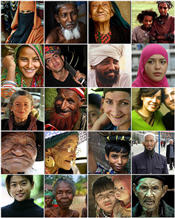
Dedicated to:
The Life of the Holy Prophet Muhammad
(peace and blessings be upon him and his family)
When:
Sunday, May 25 (Memorial Day Weekend)
3pm – 10pm
Where:
Mehran Restaurant, 5774 Mowry School Road, Newark, California
Â
- International Speakers
- Intellectual and Spiritual Discourse
- Poetry, Qasaid and Na’at Recitations
- Sufi Cultural Expression (Qawwali, Daf, etc)
- Prayer, Education, Spirituality, Culture, Food
May 9, 2008 (Fremont, CA): As efforts are underway in search for a true and lasting peace around the world by those who are committed to its cause, the members of the Islamic Educational and Cultural Research Center (IECRC) are ramping up for their Annual Conference themed on the same concern, during the Memorial Day weekend, Sunday, May 25, 2008 in the exquisite Mehran Restaurant (5774 Mowry School Road, Newark) in Northern California.
Â
The IECRC is a six year old non-profit, non-political, 501(c)(3), grassroots, community service organization, based in Northern California, created in the wake of the September 11th tragedy with the mission to promote spirituality through education, research, and counseling, based on the centuries old Islamic traditional values of the Awliyah (the Saints of the Islamic Tradition) — love, tolerance, peace and harmony.
Â
Muslims believe that the Holy Prophet Muhammad (peace and blessing be upon him and his family) was the last of a long chain of Prophets of God (peace and blessing of God upon them all), and that his message was a Universal one in that he was not just sent to the Arabs, but to all of Humanity, and that the message he brought holistically embodies the principle of Peace. Thus the religion was not named “Muhammadism†or similar, but rather “Islam†or “Peace.† Each year, the IECRC dedicates its annual conferences to the life of the Prophet of Peace.
Â
As part of a global community, it is essential that the individual consciousness of people grows into a joint social order. World Peace, an element of this order, can only be achieved when respect for the “Other†becomes the norm and rich exchanges of cultural values and perspectives are common.
Â
To help achieve this goal, two purposes have been identified for the 5th Annual IECRC Conference: 1) Promote interaction between diverse communities through an exchange of ideas and culture in an effort to achieve respect for each other at a local level; and 2) Educate about the code of behavior as practiced by the pious predecessors and Saints of the Islamic tradition (may God be pleased with them all) in promoting the values of unity, peace, love, harmony, and tolerance at a global level.
Â
The conference will aim to shed light on the intellectual and spiritual tradition of these values, as lived and practiced for over 14 centuries by countless spiritual luminaries in Islam. “The Islamic tradition teaches that peace is achieved through tolerance and forgiveness.†Thus, the contributions of the great men and women who lived and died according to this principle are immense and warrant attention in the modern age when inspiration and guidance are needed even more than ever. The conference will consist of speakers from diverse cultures and perspectives towards World Peace, and will include intellectuals, social workers and religious scholarship, both from within and outside the fold of Islam. As a result, the theme for the conference has been named: Respecting Cultural Values: a Criterion for World Peace.
Â
“Through the interaction of notable personalities from different cultures, backgrounds, and levels, doors will be opened towards new avenues addressing the complex problems that we face in achieving world peace and harmony,†says Prof. Dr. Mohammad Ahmed Qadri, Founding Director of the IECRC.  Dr. Qadri is a renowned scholar and the recipient of many prestigious international awards including the Ambassador for Peace Award presented by the Universal Peace Foundation and Interreligious and International Federation for World Peace in Canada.
Â
Among the international and national guest speakers confirmed to present are keynote speaker, Dr. Prof, Muhammad Ahmed Qadri, Ph. D in Political Science, Islamic Scholar, and Founding Director of the IECRC (via remote message); Prof. Dr. Derryl Maclean, Associate Professor, Social Historian of Religion, Department of History, and Director, Simon Fraser University, British Columbia, Canada; Prof. Dr. Neelam Canto-Lugo, Professor, English Department, and Director of Crossing Borders Building Bridges series of lectures and presentations, Yuba College, Marysville, California; Farzana Nayani M.A., Education, Training Consultant and Cross-Cultural Researcher, Los Angeles, California; Mr. Charan Gill, M.A., M.S.W., Social Worker, Community Activist and CEO Progressive Intercultural Community Services Society, Surrey, British Columbia. Several other important personalities at the local, national, and international level have also been invited and are expected to present at the conference. The event will also be an exhibition of the rich fabric of Islamic culture in the recitations of poetry praising the Holy Prophet Muhammad (peace be upon him) in many languages including English, Urdu, Farsi, Arabic, and Punjabi. The conference will include the traditional Sufi Qawwali Samaa (devotional music) of the Subcontinent with performance by Mr. Muhammad Shaan and ensemble. There will be much young talent on display in the many children’s performances which are a part and parcel of all IECRC events. Attendance of a diverse audience is expected from around the Greater Bay Area and beyond.
Â
We invite all regardless of religion or race to join us for an evening of spirituality, knowledge, poetry, peace building, and friendship.
Admission is free. Childcare is available. Complimentary Dinner is served.
This event is open to all.
Visit www.maulud.org for registration and additional details about the Conference.
Media Contacts: Ayyaz Yousaf Qadri at 510-475-7867 (ayyazy@yahoo.com),
Sharaaz Khan at 916-687-7547 (sharaaz2001@yahoo.com).
Â
e-Book: My Little Prayer Book
DOWNLOAD E-Book:My Little Prayer Book
About the Book
The purpose of compiling MY LITTLE PRAYER BOOK is to educate children about Wudu, and Salaah. And most importantly, teach children how to perform the correct Wudu and the correct Salaah, the way in which Prophet Muhammad صلى الله عليه وسلم used to perform in His daily routine.







